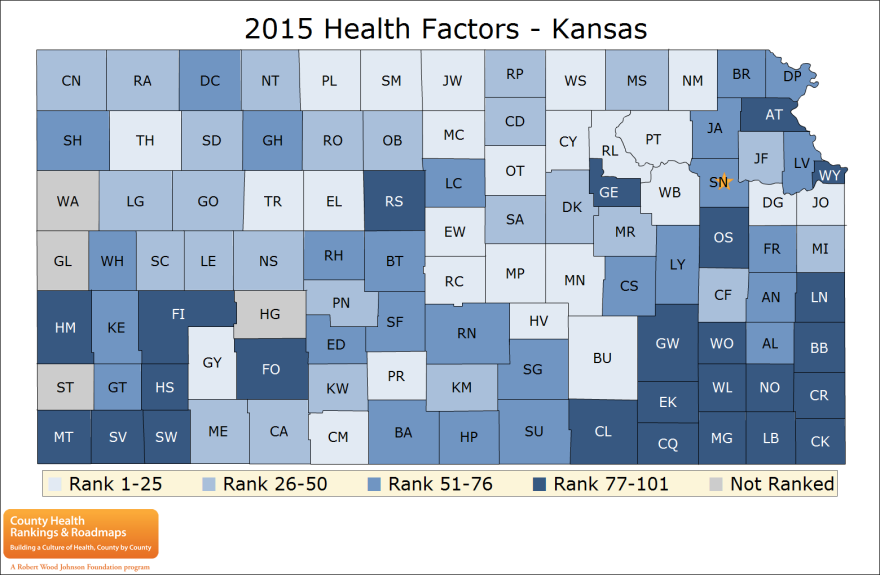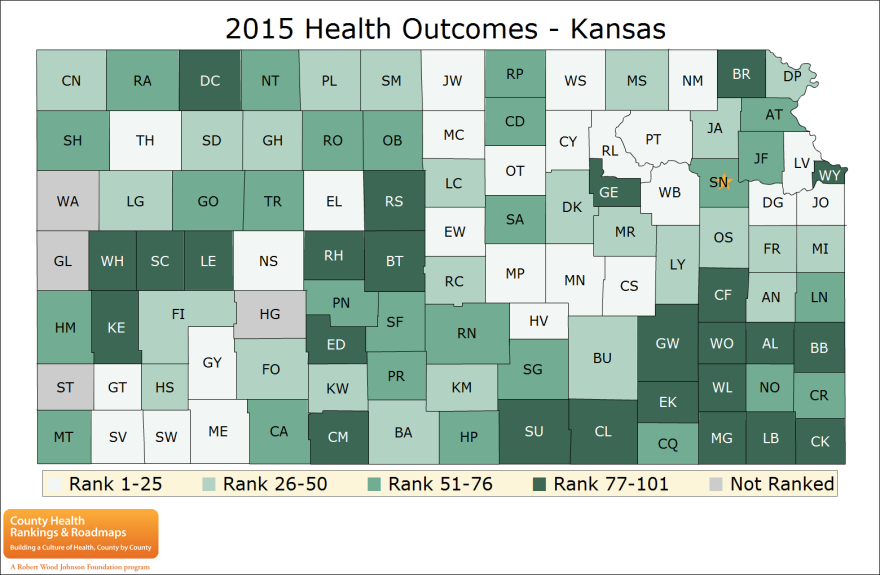Health is deteriorating in many rural counties while improving in many urban ones in Kansas and Missouri. But Kansas City’s innermost urban counties – Jackson and Wyandotte – continue to struggle, according to new annual county health rankings from the Robert Wood Johnson Foundation and the University of Wisconsin Population Health Institute. Alex Smith spoke with University of Wisconsin-Madison researcher Kate Konkle, who was one of the report’s researchers.
I noticed that the innermost parts of this area in Kansas City – Jackson County in Missouri and Wyandotte County in Kansas – are still really struggling compared with the surrounding areas. Can you tell me what’s happening there?
So it’s not unusual for us to see large urban counties not performing as well as, generally, what are more suburban, surrounding communities. There’s often higher incomes – people living out in the suburbs – in those surrounding counties around the large urban communities.

I think an important thing to point out, though, is that there’s great work going on in both of these places. Wyandotte County was one of our early adopters. When Mayor Joe Reardon was there several years ago, he really used the lower ranking as a call to action and really rallied the community to begin this journey toward better health.
In 2015, Kansas City, Missouri, was actually awarded the Robert Wood Johnson Culture of Health prize, really affirming that the work going on there, while they haven’t gotten to their end goal yet, that they’re really moving in a positive direction.

Now when you look at the counties that seem to be struggling the most, it does seem to be the ones that are the innermost urban areas and then also some of the more remote rural counties. Are those two areas dealing with similar health issues, or are they dealing with separate things?
That’s a great question. You know, we have some key findings this year where we really looked at some differences between rural and urban counties. So we know that in large, urban counties that life expectancy – the premature death rates are improving – while in rural counties those numbers are continuing to rise. We also know that rural counties have higher rates of smoking,

obesity, child poverty and teen birth rates, and those large urban counties tend to have actually lower smoking and obesity rates and fewer injury deaths. And they have more residents who attend college.
So there’s a lot of similarity. I would say those social and economic factors – unemployment and income can be two of them – but there’s also some significant differences.
The overview also does point out that there seems to be this continuing trend of worsening health in rural counties. What’s going on there?

You know I think that’s going to look different in each county. But we know that in many rural communities, the populations are aging. There’s not always as many opportunities for well-paying jobs in rural communities. It can be hard to attract good health care to those communities, and so it’s definitely something we want to highlight and bring attention to, given that nearly two-thirds of all counties in the U.S. are rural.

The new rankings add a few new measures, including racial segregation. What’s the significance of that to health?
We added these because we know that the health of blacks and other minority groups suffers when they live in highly segregated neighborhoods, and we want to recognize that this is an issue. One thing we know is that looking at county-level data doesn’t show the full picture of what’s happening within a county, and things look different in different communities and different neighborhoods in that community. And so we know that the health of blacks and other minority populations suffers when they live in segregated neighborhoods, and we want communities to think about making sure that there’s good, safe, affordable housing and access to that with financing, revitalizing neighborhoods with community input. Thinking about things like living wage and access to healthy foods and reliable public transportation. So we know there’s things that communities can do to ensure that everyone in the community, regardless of where they live, can live a long and healthy life.
The new rankings also add sleep deprivation as a health measure. How important is that to health?
Sleep is an important part of a healthy lifestyle, and it plays a really key role in both allowing your body to just recover on a regular basis – sort of maintaining and repairing that. Learning and memory are connected to sleep. Problem solving, decision making, emotional control. But we also know that ongoing sleep deficiency is linked to things like heart disease, kidney disease, high blood pressure. So there’s really significant risks with long-term, insufficient sleep.
So we want to call attention to this, that it’s not just about a comfort thing. It really does impact people’s health in the long run, and it’s important to think about how we can help people get better sleep. I know schools are starting to think about maybe shifting their day by delaying start times for middle school and high school students. That really can help. But even just making sure that people are aware that this is not just a lifestyle and comfort issue, but it’s a health issue.
Alex Smith is a reporter for KCUR, a partner in the Heartland Health Monitor team. You can reach him on Twitter @AlexSmithKCUR








